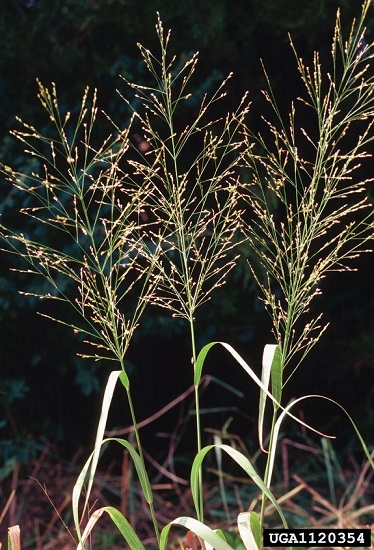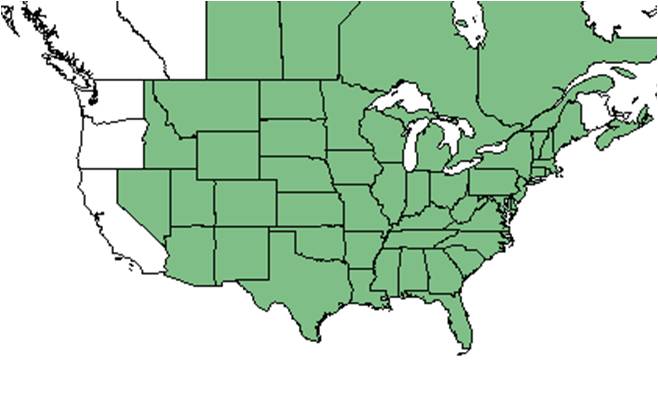Difference between revisions of "Panicum virgatum"
(→Conservation and Management) |
Krobertson (talk | contribs) |
||
| Line 25: | Line 25: | ||
==Description== | ==Description== | ||
| − | "Spikelets usually in panicles, round or nearly so in cross section, 2-flowered, terminal fertile, basal sterile, neutral or staminate. First glume usually present, 2nd glume and sterile lemma similar; fertile lemma and palea indurate without hyaline margins. Taxonomically our most difficult and least understood genus of grasses, more than 100 species and varieties are ascribed to the Carolinas by some authors. Note general descriptions for species groups (e.g., 1-4, 5-8, 9-13, and 26-62)." | + | "Spikelets usually in panicles, round or nearly so in cross section, 2-flowered, terminal fertile, basal sterile, neutral or staminate. First glume usually present, 2nd glume and sterile lemma similar; fertile lemma and palea indurate without hyaline margins. Taxonomically our most difficult and least understood genus of grasses, more than 100 species and varieties are ascribed to the Carolinas by some authors. Note general descriptions for species groups (e.g., 1-4, 5-8, 9-13, and 26-62)." <ref name="Radford et al 1964">Radford, Albert E., Harry E. Ahles, and C. Ritchie Bell. Manual of the Vascular Flora of the Carolinas. 1964, 1968. The University of North Carolina Press. 145. Print.</ref> |
| − | "Elongate, rhizomatous perennial; culms 5-15 dm tall. Blades to 5 dm long, 1.5-8 mm wide, sparsely pilose above basally; sheaths occasionally pubescent, margins occasionally densely ciliate; ligules ciliate or lacerate, 1.5 mm long. Panicle open, 12-50 cm long, 6-20 cm broad. Spikelets 2.8-4.2 mm long. Frist glume 5-9 nerved, acute to keeled-cuspidate, 1.4-3.0 mm long, 2nd glume and sterile lemma 7-9 nerved, acute to cuspidate, 2.8-4.2 mm long, sterile palea2-2.6 mm long; fertile lemma 2-2.6 mm long. Grain grayish, 1-2 mm long." | + | "Elongate, rhizomatous perennial; culms 5-15 dm tall. Blades to 5 dm long, 1.5-8 mm wide, sparsely pilose above basally; sheaths occasionally pubescent, margins occasionally densely ciliate; ligules ciliate or lacerate, 1.5 mm long. Panicle open, 12-50 cm long, 6-20 cm broad. Spikelets 2.8-4.2 mm long. Frist glume 5-9 nerved, acute to keeled-cuspidate, 1.4-3.0 mm long, 2nd glume and sterile lemma 7-9 nerved, acute to cuspidate, 2.8-4.2 mm long, sterile palea2-2.6 mm long; fertile lemma 2-2.6 mm long. Grain grayish, 1-2 mm long." <ref name="Radford et al 1964"/> |
==Distribution== | ==Distribution== | ||
| Line 49: | Line 49: | ||
==References and notes== | ==References and notes== | ||
| − | |||
Revision as of 19:11, 3 August 2016
| Panicum virgatum | |
|---|---|

| |
| Photo by James H. Miller & Ted Bodner, Southern Weed Science Society, Bugwood.org | |
| Scientific classification | |
| Kingdom: | Plantae |
| Division: | Tracheophyta- Vascular plants |
| Class: | Lilianae - Monocotyledons |
| Order: | Poales |
| Family: | Poaceae |
| Genus: | Panicum |
| Species: | P. virgatum |
| Binomial name | |
| Panicum virgatum L. | |

| |
| Natural range of Panicum virgatum from USDA NRCS Plants Database. | |
Common names: Old Switch Panic Grass; Switchgrass
Contents
Taxonomic notes
Synonym: Panicum virgatum Linnaeus var. virgatum
Description
"Spikelets usually in panicles, round or nearly so in cross section, 2-flowered, terminal fertile, basal sterile, neutral or staminate. First glume usually present, 2nd glume and sterile lemma similar; fertile lemma and palea indurate without hyaline margins. Taxonomically our most difficult and least understood genus of grasses, more than 100 species and varieties are ascribed to the Carolinas by some authors. Note general descriptions for species groups (e.g., 1-4, 5-8, 9-13, and 26-62)." [1]
"Elongate, rhizomatous perennial; culms 5-15 dm tall. Blades to 5 dm long, 1.5-8 mm wide, sparsely pilose above basally; sheaths occasionally pubescent, margins occasionally densely ciliate; ligules ciliate or lacerate, 1.5 mm long. Panicle open, 12-50 cm long, 6-20 cm broad. Spikelets 2.8-4.2 mm long. Frist glume 5-9 nerved, acute to keeled-cuspidate, 1.4-3.0 mm long, 2nd glume and sterile lemma 7-9 nerved, acute to cuspidate, 2.8-4.2 mm long, sterile palea2-2.6 mm long; fertile lemma 2-2.6 mm long. Grain grayish, 1-2 mm long." [1]
Distribution
Ecology
Seed dispersal
According to Kay Kirkman, a plant ecologist, this species disperses by gravity. [2]